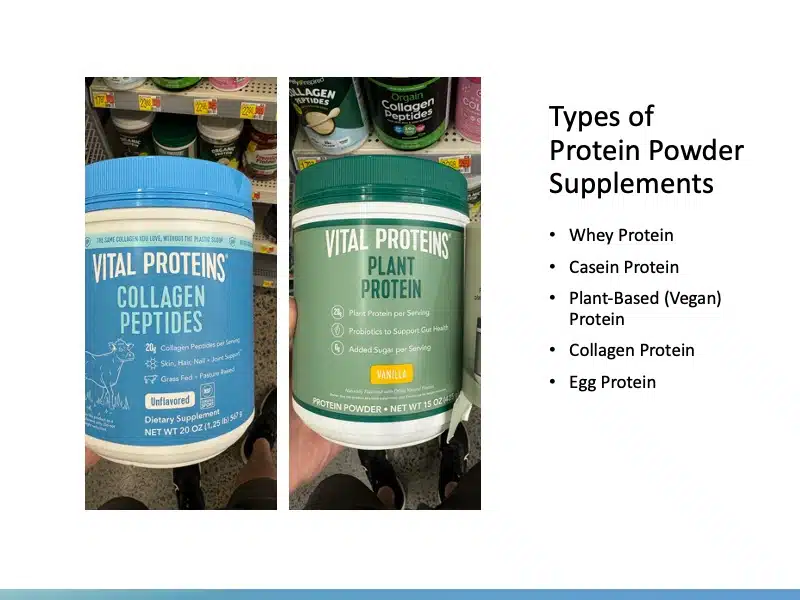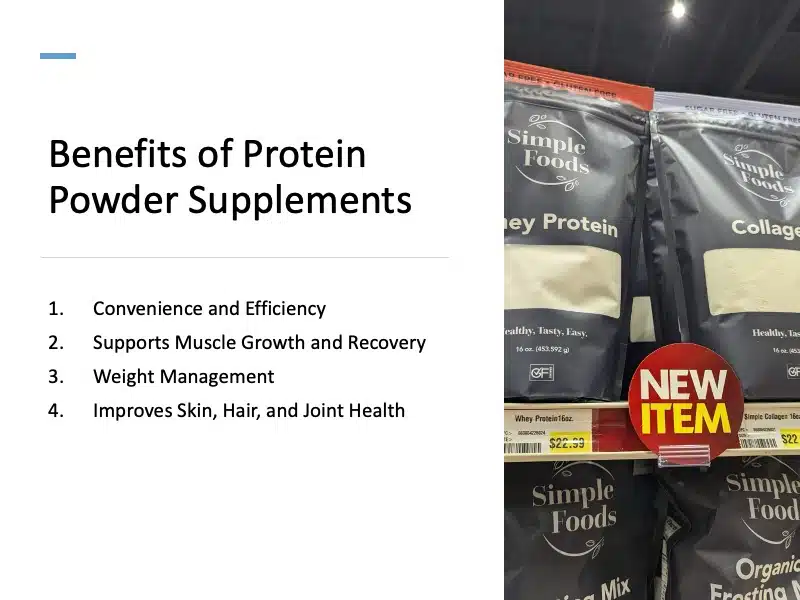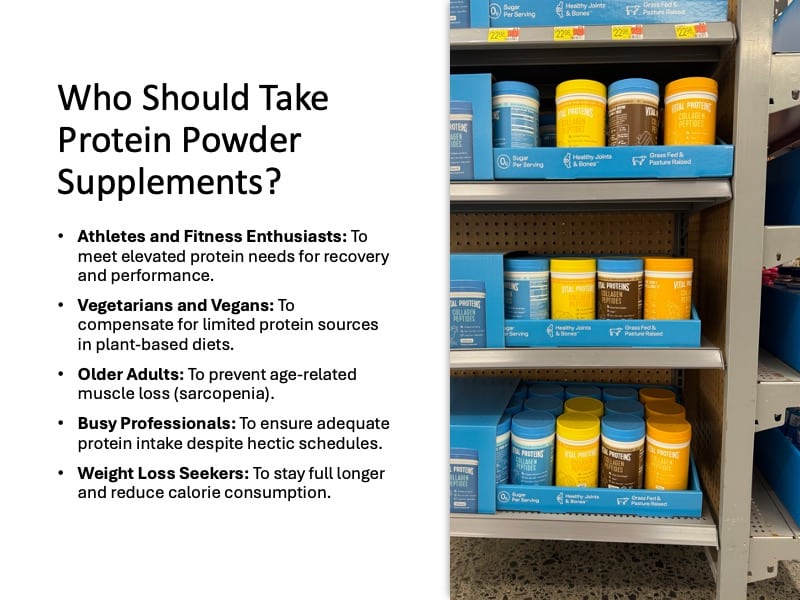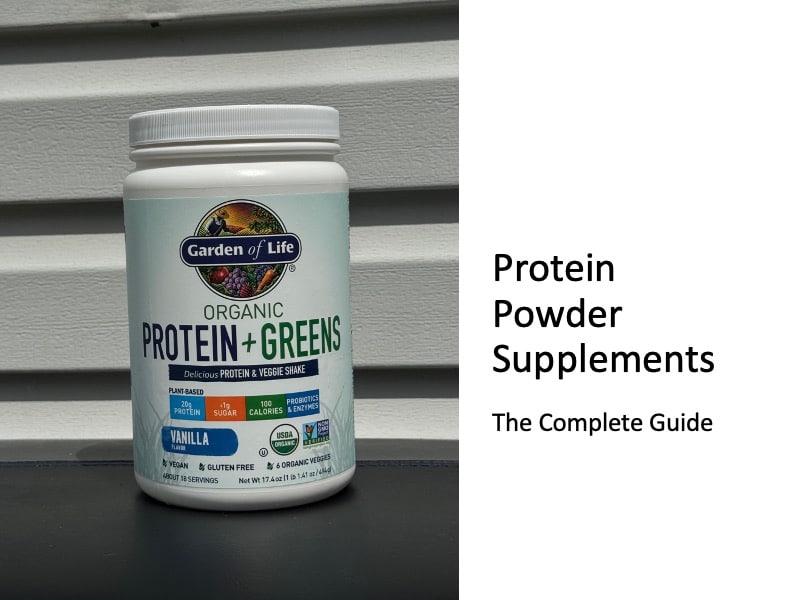Protein Powder Supplements: Benefits, Uses, Best Choices
Over the years, I’ve used various forms of protein powder supplements and found them to be one of the most practical and effective tools for meeting protein needs, whether during a busy season of professional basketball, a demanding off-season training block, or really any time of year.
Meeting your daily protein needs can be challenging, especially if you’re balancing training, work, family, or dietary limitations.
That’s where protein powder supplements offer real value.
They provide a fast, reliable, and effective way to support muscle growth, enhance recovery, manage body composition, and maintain long-term health.
About eight years ago, I moved away from whey protein due to its negative impact on my digestion and asthma.
Since then, I’ve relied on vegan protein powders and hydrolyzed collagen, which have been much easier on my system and better for my overall well-being.
Despite my personal shift, I still believe that protein powder—whether whey, plant-based, casein, collagen, or egg—is an incredibly effective option for most people.
Many individuals with active lifestyles or dietary restrictions struggle to get enough high-quality protein from food alone, and protein powder helps bridge that gap in a convenient, affordable, and versatile way.
For optimal muscle gain, research suggests consuming around 1.6–2.2g of protein per kilogram of body weight per day, while 1.0g/kg is generally sufficient for baseline health.
Personally, I’ve experienced the best results in terms of strength and body composition at the 2.0g/kg level—something that would be difficult to reach without the support of high-quality protein powders.
Whether you’re an athlete, a training enthusiast, or someone focused on longevity and recovery, protein powders are one of the most efficient, science-backed investments you can make in your health and performance.
What Is Protein Powder?
Protein powder is a concentrated source of protein derived from animal or plant foods such as milk, eggs, peas, or rice.
It’s one of the most popular nutritional supplements in the world, valued for its ability to support muscle recovery, improve body composition, and fill nutritional gaps.
Available in forms like whey, casein, soy, pea, and collagen, protein powders cater to various dietary preferences and fitness goals.
From elite athletes to busy parents or older adults, protein powder supplements offer a practical solution for efficiently meeting daily protein needs.
Protein Powder Supplements vs Protein Shakes: What’s the Difference?
Although often used interchangeably, protein powder and protein shakes are not the same.
Understanding the difference can help you make better choices based on your nutritional needs, lifestyle, and health goals.
Protein powder is a dry, powdered supplement made by extracting protein from sources like whey, casein, soy, peas, or collagen. It’s meant to be mixed into liquids such as water, milk, or smoothies to create a shake.
- Customizable: You control the ingredients by adding your preferred liquid, fruits, vegetables, or other boosters like creatine or fiber.
- Shelf-stable and economical: Buying in bulk often saves money and reduces waste.
- Macro-flexible: Helps dial in exact protein amounts depending on your training or diet phase.
A protein shake refers to the final, consumable drink made by mixing protein powder with liquid—or a ready-to-drink (RTD) product that comes pre-mixed in a bottle or carton.
- Ready-to-Drink (RTD) Shakes: These are fully prepared, require no mixing, and are ideal for on-the-go nutrition. Brands like OWYN or Fairlife make high-quality RTD shakes with balanced macros.
- Homemade Shakes: Mixing your own protein powder with added fruits, oats, nut butters, or greens transforms it into a full meal or recovery shake.
| Feature | Protein Powder | Ready-to-Drink Protein Shake |
|---|---|---|
| Preparation Needed | Requires mixing with a liquid | Pre-mixed and ready to drink |
| Customization | Fully customizable (flavor, texture, etc.) | Limited unless homemade |
| Cost | More affordable per serving | Typically more expensive |
| Portability | Needs shaker or blender | Extremely portable |
| Shelf Life | Longer (unopened powder lasts months) | Shorter once opened |
| Ingredients Control | You control all added ingredients | Often includes stabilizers or sweeteners |
- You can choose protein powder if you want flexibility, better value, and control over what goes into your shake. It’s the preferred option for most athletes, gym-goers, and nutrition-conscious individuals.
- Choose ready-to-drink protein shakes if you value convenience and portability, especially for travel days, work commutes, or emergency snacks.
Types of Protein Powder Supplements

The protein powder market offers a wide range of options tailored to different dietary preferences, fitness goals, and health needs.
Choosing the right type of protein powder allows you to maximize its benefits while seamlessly integrating it into your daily routine.
Below is a detailed overview of the most common, but not all, types of protein powder supplements, to help you make an informed decision.
Whey Protein
Whey protein is a fast-digesting, high-quality protein derived from milk. It is a byproduct of the cheese-making process and is rich in essential amino acids, particularly leucine, a key driver of muscle protein synthesis.
- Benefits: Ideal for post-workout recovery due to its rapid absorption and ability to repair muscle fibers effectively. It also contains immunoglobulins that may support immune health.
- Best Use: Consume within 30 minutes after exercise for maximum muscle recovery and growth.
- Drawbacks: Some individuals may experience digestive discomfort or lactose intolerance with whey.
Research Highlight: A study in The American Journal of Clinical Nutrition found that whey protein supplementation significantly increased muscle protein synthesis compared to other protein sources, particularly when consumed post-workout (Tang et al., 2009).
Casein Protein
Casein protein is the other primary protein found in milk. Unlike whey, casein digests slowly, providing a sustained release of amino acids into the bloodstream.
- Benefits: Excellent for preventing muscle breakdown during fasting periods, such as overnight. Its slow digestion makes it particularly effective for preserving muscle mass.
- Best Use: Consume before bed or during prolonged periods without food.
- Drawbacks: Similar to whey, casein may not be suitable for those with lactose intolerance.
Research Highlight: A study published in Medicine & Science in Sports & Exercise demonstrated that casein protein before sleep significantly enhanced overnight muscle protein synthesis, leading to improved recovery (Res et al., 2012).
Plant-Based Protein
Plant-based protein powders are derived from sources like pea, rice, hemp, and pumpkin seed.
They are an excellent choice for vegans, vegetarians, individuals with dairy allergies or sensitivities, and people who want more micronutrient-dense protein powder supplements.
Since most plants are not complete sources of amino acids, most plant-based powders combine multiple sources to create a complete amino acid profile.
- Benefits: Easy on digestion, hypoallergenic, and sustainable. Rich in fiber and micronutrients when sourced from whole plants.
- Best Use: Versatile for any time of day, including post-workout or as a meal replacement.
- Drawbacks: Single-source plant proteins, such as rice, may lack certain essential amino acids. Blends are preferred for better nutritional balance.
Research Highlight: A 2015 study in The Journal of the International Society of Sports Nutrition found that pea protein was equally effective as whey protein in promoting muscle thickness when combined with resistance training (Babault et al., 2015).
Collagen Protein
Collagen protein is derived from animal connective tissues, such as bovine hides or fish scales.
Bovine collagen is especially popular, and it is generally hydrolyzed for better absorption.
However, collage protein is more effective for supporting connective tissues rather than muscle growth.
- Benefits: Improves skin elasticity, hair strength, joint health, and gut lining integrity.
- Best Use: Ideal for general health, particularly skin, joint, and recovery support. Mix with coffee or smoothies in the morning.
- Drawbacks: Lacks branched-chain amino acids (BCAAs) essential for muscle synthesis, so it’s not ideal for building lean muscle.
Research Highlight: A 2008 study reported significant improvements in joint pain and function among athletes consuming collagen peptides daily for 24 weeks (Clark et al., 2008).
Egg Protein
Egg protein is made from egg whites and provides a complete amino acid profile. It is naturally lactose-free, making it a good alternative for those who avoid dairy.
- Benefits: Balanced digestion speed, providing steady amino acid delivery. Rich in essential amino acids, especially sulfur-containing ones like methionine.
- Best Use: Suitable for any time of day and versatile for different dietary needs.
- Drawbacks: Higher cost compared to whey or casein and may trigger allergies in some individuals.
Research Highlight: Research published in The Journal of Nutrition found that egg protein has a high biological value, meaning it is efficiently utilized by the body for muscle repair and growth (Layman et al., 2009).
Benefits of Protein Powder Supplements

Protein is vital for building and repairing tissues, producing enzymes and hormones, and maintaining muscle mass. While whole foods should always be prioritized, protein powder supplements provide a range of unique benefits that can improve both health and fitness.
Convenience and Efficiency
Protein powders offer an unmatched level of convenience for people with busy lifestyles. They require minimal preparation, are portable, and can deliver a complete dose of high-quality protein in just minutes.
This is particularly beneficial for those who struggle to plan or cook meals consistently.
Supports Muscle Growth and Recovery
Protein powders, especially those high in leucine (like whey), are proven to enhance muscle protein synthesis.
Consuming protein post-workout can speed up recovery, reduce muscle soreness, and promote lean muscle growth.
Research emphasizes that consuming 20–40g of high-quality protein, such as whey, optimizes muscle repair and growth after resistance exercise.
Additionally, consuming protein powder before a workout can help increase circulating amino acid levels during training, which supports an anabolic environment and reduces muscle breakdown.
Even outside the workout window, regular protein supplementation throughout the day helps maintain a positive nitrogen balance—essential for continuous recovery and muscle preservation.
Weight Management
Protein powders are good for weight loss for several reasons.
For example, protein is known to increase satiety and reduce overall calorie consumption, making it an excellent tool for weight management.
Its high thermic effect also increases the number of calories burned during digestion compared to fats or carbohydrates.
A 2020 study in the Journal of Obesity & Metabolic Syndrome found that high-protein diets, supported by supplementation, significantly improved weight loss outcomes compared to lower-protein diets.
Additionally, protein powder supplements not only reduce hunger levels but also help preserve lean body mass during calorie deficits (Moon & Koh, 2020).
Improves Skin, Hair, and Joint Health
Collagen protein has become increasingly popular due to its unique benefits for skin, hair, and joint health.
Hydrolyzed collagen is easily absorbed by the body, promoting better hydration, elasticity, and repair of connective tissues.
A 2019 randomized, placebo-controlled trial published in the Journal of Drugs in Dermatology showed that daily collagen supplementation improved skin elasticity and hydration after 12 weeks of consistent use (Choi et al., 2019).
Additionally, the study reported benefits in joint mobility and reduced joint pain among participants, highlighting its dual purpose for both aesthetic and functional improvements.
While collagen is the most direct source of nutrients for skin and joint health, other protein powders, such as whey, casein, and plant-based proteins, support tissue repair indirectly by supplying essential amino acids needed for overall protein turnover, including the maintenance of hair follicles, dermal structure, and connective tissues.
Regular intake of complete proteins also helps prevent muscle loss and supports healthy aging, which contributes to both internal and external vitality.
How to Use Protein Powder Supplements
Protein powder is one of the most versatile and user-friendly supplements available.
Whether your goal is muscle growth, fat loss, or general wellness, it can be integrated into your daily routine in a variety of simple and effective ways.
Best Times to Take Protein Powder Supplements
- Post-Workout: Whey protein is ideal after training due to its fast absorption and high leucine content.
- Pre-Workout: A shake with protein and carbs 30–60 minutes before exercise can support energy levels and reduce muscle breakdown.
- Before Bed: Casein protein slowly digests overnight, promoting recovery while you sleep.
- Meal Replacement: Combining a protein powder supplement with fruits, greens, nuts and seeds can serve as a healthy meal or snack alternative.
- Anytime Support: Plant-based or egg white proteins are excellent for bridging long gaps between meals or adding extra protein to meals.
- Morning: Collagen protein combined with coffee or smoothies supports gut, joint and skin health.
Mix with Water or Milk for a Quick Shake
The most common and convenient method is blending protein powder with water, milk, or a milk alternative.
Water keeps it low-calorie, while milk or fortified plant-based options add extra protein, carbs, and micronutrients that can enhance recovery and satiety.
Add to Smoothies or Shakes
Protein powders can elevate the nutritional value of smoothies when combined with fruits, vegetables, oats, nut butters, or seeds.
This turns your supplement into a balanced meal replacement or pre/post-workout fuel.
Use in Recipes for Baked Goods or Snacks
Incorporating protein powder into pancakes, muffins, overnight oats, or energy bites is a great way to increase daily protein intake without relying solely on shakes.
Just be mindful of heating collagen or certain plant-based proteins, which may denature under high heat.
Adjust the Amount Based on Your Needs
Most people benefit from 20–30g of protein powder per serving, but the exact amount should be tailored to your total daily protein needs and dietary intake.
Consistency is more important than timing alone—regularly hitting your protein target is what ultimately supports your fitness and health outcomes.
How Much Protein Powder Should You Use Per Day ?
There’s no universal limit on how much protein powder you can consume daily, but it’s most effective when used to supplement—not replace—whole food protein sources.
The ideal amount depends on your total protein needs, your current diet, and your training demands.
General Protein Guidelines
There is a lot of debate about how much protein you need to gain muscle, but for most active individuals, a daily intake of 1.6 to 2.2 grams of protein per kilogram of body weight supports muscle growth, recovery, and fat loss.
If you’re sedentary or aiming for general health, 1.0 to 1.2 g/kg of protein per day is typically sufficient.
Protein Powder Intake Recommendations
Protein powder should help fill the gap between the protein you get from food and your daily target. For most people, this means:
- 1 to 2 scoops per day (typically 20–50g of protein total) is safe and effective.
- Some athletes or individuals on plant-based diets may benefit from up to 3 scoops per day, depending on overall needs.
Why Balance Matters
Using too much protein powder—while not inherently dangerous—can displace other vital nutrients from your diet.
Whole foods provide fiber, vitamins, minerals, and phytonutrients that powders alone lack.
Prioritize getting at least half of your daily protein from whole food sources like meat, fish, dairy, legumes, or tofu for optimal nutrition.
When to Increase Protein Powder Intake
- You’re in a calorie deficit and trying to preserve lean muscle
- You follow a vegan or vegetarian diet and struggle with protein variety
- You have high training volume and need fast, digestible protein post-workout
- You’re recovering from injury or illness and need more protein to support healing
As long as you’re meeting your needs from a balanced diet, using 1–3 servings of protein powder per day is both practical and safe for most healthy individuals.
Who Should Take Protein Powder Supplements?

Protein powder supplements are not just for athletes or bodybuilders; they can be useful for a variety of individuals:
- Athletes and Fitness Enthusiasts: To meet elevated protein needs for recovery and performance.
- Vegetarians and Vegans: To compensate for limited protein sources in plant-based diets.
- Older Adults: To prevent age-related muscle loss (sarcopenia).
- Busy Professionals: To ensure adequate protein intake despite hectic schedules.
- Weight Loss Seekers: To stay full longer and reduce calorie consumption.
Can Teens Have Protein Powder?
Yes, teens can use protein powder safely in many cases, but only when it’s used appropriately and as part of a balanced, nutrient-dense diet.
Adolescence is a critical period of growth that increases protein requirements for muscle development, hormone production, and tissue repair.
Teen athletes, in particular, may struggle to meet their needs through food alone, especially during intense training seasons or growth spurts.
Protein powders can be a convenient way to support these needs when whole food intake falls short.
However, they should supplement—not replace—meals built around whole protein sources like eggs, dairy, lean meats, legumes, and grains.
- Choose clean, third-party tested products without artificial sweeteners or unnecessary stimulants.
- Look for simple options like whey isolate, pea protein, or blends designed for adolescents.
- Stick to 1 serving per day, typically 15–25g of protein, based on individual needs and total dietary intake.
- Avoid performance enhancers or weight gainers, which may contain ingredients unsuitable for developing bodies.
Protein powder can be useful for teens with high energy demands or limited food variety, but it should never be a crutch for poor eating habits.
Parents and teens should work with a pediatrician, registered dietitian, or sports nutritionist to ensure it’s being used safely and effectively.
Can Kids Have Protein Powder?
Since there are so many benefits of protein powders for adults and athletes, many people wonder, “Are protein shakes good for kids?”
For most children, a well-balanced diet provides all the protein they need to support healthy growth and development.
However, in certain cases—such as picky eating, high activity levels, or plant-based diets—protein shakes can help fill nutritional gaps.
When choosing a protein shake for kids, it’s essential to opt for clean, age-appropriate formulas without artificial additives or excessive vitamins and minerals.
One example is the Naked Nutrition Kids Daily Essentials Protein Shake, which is specifically formulated for children.
It includes 8g of protein from pea and pumpkin seed, plus organic fruits, vegetables, fiber, and probiotics—making it a well-rounded option for occasional use.
While protein shakes can be helpful in specific situations, they shouldn’t replace whole foods.
Parents should always consult a pediatrician or dietitian before making protein shakes a regular part of their child’s diet.
Last update on 2025-04-15 / This article includes affiliate links/Images via Amazon Product Advertising API. I may earn commissions on purchases made through these links.
The Best Protein Powder Supplements
With countless protein powder supplements on the market, finding the right one can feel overwhelming. Each protein powder supplement caters to different needs, whether you’re looking to build muscle, support overall health, or find an affordable, high-quality option.
To help narrow your choices, I’ve ranked the best protein powder supplements based on their unique benefits, effectiveness, and versatility.
From plant-based blends to collagen peptides and industry-leading whey and casein options, this list has something for everyone.
My Favorite & Best Overall: Garden of Life Organic Protein & Greens
Garden of Life Organic Protein and Greens is a plant-based powerhouse combining organic protein with nutrient-dense greens. It is USDA-certified organic, non-GMO, and free from artificial additives, making it ideal for those seeking a clean, high-quality supplement.
Key Benefits:
- Contains 20g of protein per serving with greens like alfalfa and spinach for added micronutrients.
- Rich in digestive enzymes and probiotics to support gut health.
- Vegan, gluten-free, and soy-free.
Importantly, I believe this is the best protein powder at Walmart because their price is considerably lower than on Amazon or other retailers.
Last update on 2025-04-16 / This article includes affiliate links/Images via Amazon Product Advertising API. I may earn commissions on purchases made through these links.
Best Whey Protein: Optimum Nutrition Gold Standard Whey
Optimum Nutrition Gold Standard Whey is a premium whey protein powder that delivers high-quality protein for muscle recovery and growth.
Key Benefits:
- Provides 24g of fast-digesting whey protein per serving.
- Contains BCAAs for muscle protein synthesis and recovery.
- Mixes easily with water, milk, or smoothies for a convenient post-workout option.
Last update on 2025-04-16 / This article includes affiliate links/Images via Amazon Product Advertising API. I may earn commissions on purchases made through these links.
Best Casein Protein: Optimum Nutrition Gold Standard Casein
Optimum Nutrition Gold Standard Casein is a slow-digesting protein ideal for nighttime use, ensuring muscle repair while you sleep.
Key Benefits:
- Delivers 24g of slow-digesting casein protein per serving.
- Provides a sustained release of amino acids to prevent muscle breakdown overnight.
- Ideal for use before bed or during long fasting periods.
Last update on 2025-04-15 / This article includes affiliate links/Images via Amazon Product Advertising API. I may earn commissions on purchases made through these links.
Best On-the-Go Protein Shakes: OWYN Protein Shakes
OWYN Protein Shakes are an all-in-one solution for busy individuals seeking a high-quality, plant-based protein source. OWYN stands for “Only What You Need,” reflecting its clean, nutrient-dense formulation.
Key Benefits:
- Provides 20g of plant-based protein per bottle with a complete amino acid profile.
- Includes superfoods like flaxseed, pumpkin seed, and pea protein.
- Dairy-free, gluten-free, soy-free, and non-GMO, making it suitable for various dietary restrictions.
- Cold Brew Coffee flavor offers an energizing twist with added caffeine.
Last update on 2025-04-16 / This article includes affiliate links/Images via Amazon Product Advertising API. I may earn commissions on purchases made through these links.
Best Collagen: Purely Inspired Collagen Peptides
I believe Vital Proteins Collagen Peptides is the best collagen supplement because it consistently delivers noticeable results with clean, high-quality ingredients.
It’s made from grass-fed, pasture-raised bovine and hydrolyzed for superior absorption and bioavailability.
Unlike cheaper alternatives, it includes options with vitamin C and hyaluronic acid, which enhance collagen synthesis and support joint and skin health.
It also dissolves effortlessly into drinks without altering taste or texture, making daily use simple and sustainable.
While brands like Purely Inspired Collagen Peptides offer a more affordable option, Vital Proteins excels with its third-party testing, product variety, and effectiveness.
For anyone focused on recovery, healthy aging, or skin rejuvenation, this is the collagen protein powder supplement I trust and use.
Last update on 2025-04-15 / This article includes affiliate links/Images via Amazon Product Advertising API. I may earn commissions on purchases made through these links.
Final Thoughts: Important Information About Protein Powder Supplements
Protein powder supplements are one of the most practical tools for improving nutrition, enhancing performance, and supporting recovery—whether you’re an athlete, active professional, or simply aiming to stay healthy.
They offer a convenient and efficient way to meet daily protein needs, especially when whole food options fall short due to time, appetite, or dietary restrictions.
However, not all protein powders are created equal.
Choosing a high-quality, third-party-tested product with clean ingredients is essential for both safety and effectiveness.
Always consider your individual goals, dietary preferences, and digestion when selecting a type—whether that’s whey, casein, plant-based, collagen, or egg white protein.
While protein powders can be incredibly helpful, they work best when used to complement a well-rounded, nutrient-dense diet—not replace it.
Consistency, portion control, and overall lifestyle habits ultimately determine your results.
When used mindfully, protein powder can be a powerful asset in achieving long-term health, strength, and wellness.
Read Next: Plant vs Whey Protein – Is Whey or Plant Protein Better?









